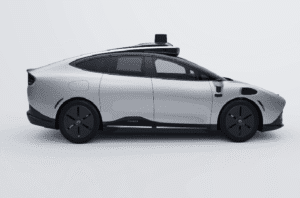Las Vegas, Nevada— At the Consumer Electronics Show (CES) this week, Intel announced an expanded lineup of products and partnerships to support automakers transitioning to electric and software-defined vehicles (SDVs). The company says this vehicle platform includes high-performance computing, graphics, artificial intelligence (AI), and power management solutions, which Intel hopes will reduce costs and improve automakers’ performance.
The IT company said the platform aims to “reduce inefficiencies of traditional fragmented approaches to vehicle architectures.” A key component of this platform is the Adaptive Control Unit (ACU), which consolidates multiple critical functions into a single chip. According to Intel, this innovation enhances efficiency and reliability, particularly for electric vehicles, by enabling them to adapt to different driving conditions and optimize energy use.
“The ACU U310 is a new processing unit that supports the consolidation of multiple real-time, safety-critical and cybersecurity functions, applications and domains (X-in-1) into a single chip,” wrote Intel in a press release. “Traditional time and sequential processing-based micro and zonal controllers struggle to handle multiple workloads due to limited deterministic processing capabilities.
“In contrast, Intel’s new family of ACU devices integrates a flexible logic area that offloads real-time control algorithms from the CPU cores, ensuring reliable performance, freedom from interference (FFI) and deterministic data delivery even when consolidating multiple microcontroller workloads into a single zonal MCU. This dual-brain approach enables greater workload consolidation, lowers cost, and enhances safety, cybersecurity and performance,” wrote the company.
Intel continues to state that when used in an EV powertrain, the ACU U310 chip “supports advanced algorithmic solutions that reduce vehicle energy demand from the battery, automatically adapting high voltage and control frequencies to individual driver styles and road conditions.” Intel believes the ACU reduces cost-per-kilowatt and enhances energy efficiency—enough to reclaim up to 40 percent of powertrain system energy losses and deliver a three- to five-percent efficiency boost. This was test against the Worldwide Harmonized Light Vehicles Test Procedure (WLTP).
“This translates to increased range, faster charging and a more responsive driving experience, while significantly reducing per-vehicle bill of materials, electric motor size and battery costs compared to traditional approaches,” reads the Intel press release.
“The ACU’s programmability allows it to serve as a first-of-its-kind software-defined zonal controller, adapting to different vehicle topologies and applications. This flexibility streamlines the transition to software-defined vehicles, simplifies supply chains and reduces the complexity of the vehicle BOM.”
Both Stellantis and Karma Automotive have shown support for Intel’s new platform, with the former planning to use the technology in its next-gen inverter controller. In this implementation, the Intel technology will control the electric motor and recover energy during braking phases—a critical point in many Formula E races.
“Intel automotive is bringing innovative solutions that reduce cost in the software-defined vehicle (SDV) revolution,” said Jack Weast, Intel Fellow, vice president and general manager of Intel Automotive. “Our whole-vehicle approach, combined with cloud integration, delivers a complete solution that drives down the total cost of development and deployment while empowering automakers to build the future of mobility faster, more efficiently and more profitably.”



















